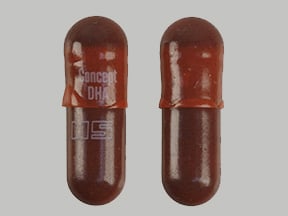
Concept Dha Coupons & Savings Card – Discount Prices from $15.54
My prescription
Edit
53.5-38-1MG, Concept Dha (30 Capsules)
Select pharmacy

CVS
$52.01
COUPON PRICE
Walmart
$15.54
COUPON PRICE
Walgreens
$26.53
COUPON PRICE
Albertsons
$34.73
COUPON PRICEConcept Dha savings card
Show this card to your pharmacist
Walmart
$15.54
BIN
ID
PCN
GRP
019876
LH072B8AE0
CHIPPO
LHX
Powered by
More prescriptions for prenatal vitamin
More prescriptions for prenatal vitamin
Price history for Concept Dha
30 Capsules, 53.5-38-1MG
Average retail price for Concept Dha
Average SaveHealth price for Concept Dha
Our price history data is based on aggregated prescription data collected from participating pharmacies in America. Our prescription data updates daily to reflect the latest price changes. If you notice a missing data point, it means there wasn't sufficient data available to generate a monetary value for that date.
*Retail prices are based on pharmacy claims data, and may not be accurate when we don't have enough claims.
Concept Dha dosage forms
Dosage Quantity Price from Per unit 53.5-38-1MG 30 Capsules $15.54 $0.52
| Dosage | Quantity | Price from | Per unit |
|---|---|---|---|
| 53.5-38-1MG | 30 Capsules | $15.54 | $0.52 |
What is the drug DHA used for?
DHA, or docosahexaenoic acid, is an omega-3 fatty acid commonly used for its potential benefits in supporting brain health, eye health, and cardiovascular health. It is often included in supplements and prenatal vitamins to support fetal brain and eye development during pregnancy. Additionally, DHA is used to help manage certain conditions such as high cholesterol and inflammation.
Is DHA necessary in baby formula?
DHA, or docosahexaenoic acid, is an omega-3 fatty acid important for brain and eye development in infants. While it is not strictly necessary in baby formula, many formulas include DHA to mimic the benefits found in breast milk, which naturally contains this nutrient. Parents should consult with a pediatrician to determine the best formula choice for their baby.
What are the side effects of concept DHA?
Concept DHA is a prenatal vitamin supplement that contains docosahexaenoic acid (DHA) and other nutrients. Some potential side effects may include nausea, upset stomach, diarrhea, or a fishy aftertaste. If any side effects persist or worsen, it is advisable to consult a healthcare provider.
Does DHA raise bad cholesterol?
DHA, or docosahexaenoic acid, is an omega-3 fatty acid commonly found in fish oil. It is generally associated with beneficial effects on heart health. While DHA can increase LDL cholesterol (often referred to as "bad" cholesterol) in some individuals, it is important to note that it also tends to increase the size of LDL particles, which may reduce cardiovascular risk. Additionally, DHA is known to lower triglycerides and may increase HDL cholesterol ("good" cholesterol). It is advisable for individuals to consult with a healthcare provider to understand how DHA might affect their specific lipid profile.
What does DHA do for your body?
DHA, or docosahexaenoic acid, is an omega-3 fatty acid that plays a crucial role in maintaining brain health, supporting cognitive function, and promoting eye health. It is a major structural component of the brain and retina. DHA is also important for heart health, as it helps reduce inflammation and may lower the risk of chronic diseases such as heart disease. Additionally, it is essential for the development of the nervous system in infants and young children.
